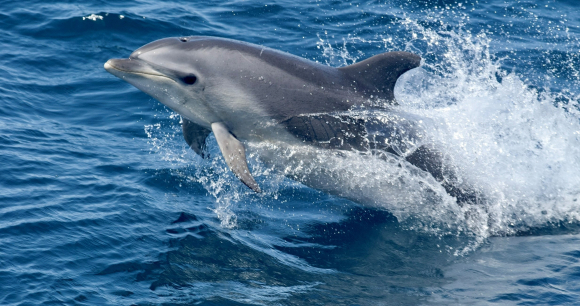
Washington, DC—The Animal Welfare Institute (AWI) is gravely disappointed to learn that an estimated 100 bottlenose dolphins were slaughtered Friday in the latest Faroe Islands drive hunt. The victims reportedly included a pregnant female and a young calf.
The dolphins were driven into the bay at Skalafjorour, the same area where more than 1,400 Atlantic white-sided dolphins were killed during a hunt last year—the largest single-day slaughter of any species of whale or dolphin in Faroese history. An additional 282 pilot whales have been killed by Faroese hunters so far this year.
Long-finned pilot whales and other small cetaceans have been hunted for human consumption in the Faroe Islands (a small Danish territory located between Scotland and Iceland in the North Atlantic) since the first human settlement of the islands. Today, however, Faroe Islanders have adopted a more typically modern Northern European way of life, with a high standard of living and no dietary dependency on whale meat. During the hunts, in fact, the wanton slaughter kills more whales than the islands’ residents could possibly consume. Much of the dolphin meat and blubber from the 2021 slaughter, for example, was discarded or incinerated.
Bottlenose dolphins, who live in closely bonded social units, are strictly protected by the European Union’s Habitats Directive, which supports the conservation of rare, threatened, or endemic species. The directive applies to Denmark, but the Faroe Islands is not itself an EU member or bound by EU rules.
An average of 666 pilot whales, 156 Atlantic white-sided dolphins and four bottlenose whales were killed annually between 2016 and 2020. Global criticism surrounding the 2021 massacre of dolphins prompted the Faroese government to recently set a provisional annual hunt quota of 500 Atlantic white-sided dolphins—well in excess of its historic average take of that species. The next quota review is not scheduled until 2024. In response, AWI joined other conservation groups in issuing a statement expressing concern, and calling on those involved to stop the killing.
During Faroese drive hunts, whales and dolphins are herded by motorboats into a bay, where men waist-deep in water jab sharp-ended hooks into the whales’ flesh or jam blunt hooks into blowholes to drag the thrashing animals onto the shore so that a spinal lance can be used to sever the main artery to the brain.
“These whales and dolphins endure unimaginable suffering during government-endorsed hunts that also cause acute distress to the victims’ family members who must watch, hear, and smell the carnage all around them,” said D.J. Schubert, AWI’s wildlife biologist. “This is a brutal and obsolete tradition that the Faroese people are risking their own health to preserve. Moreover, these hunts are ruining the reputation of the Faroe Islands government and jeopardizing its lucrative fishery exports.”
Margie Fishman, Animal Welfare Institute
[email protected], (202) 446-2128
The Animal Welfare Institute is a nonprofit charitable organization founded in 1951 and dedicated to reducing animal suffering caused by people. AWI engages policymakers, scientists, industry, and the public to achieve better treatment of animals everywhere—in the laboratory, on the farm, in commerce, at home, and in the wild. Follow us on Facebook, Twitter, and Instagram for updates and other important animal protection news.